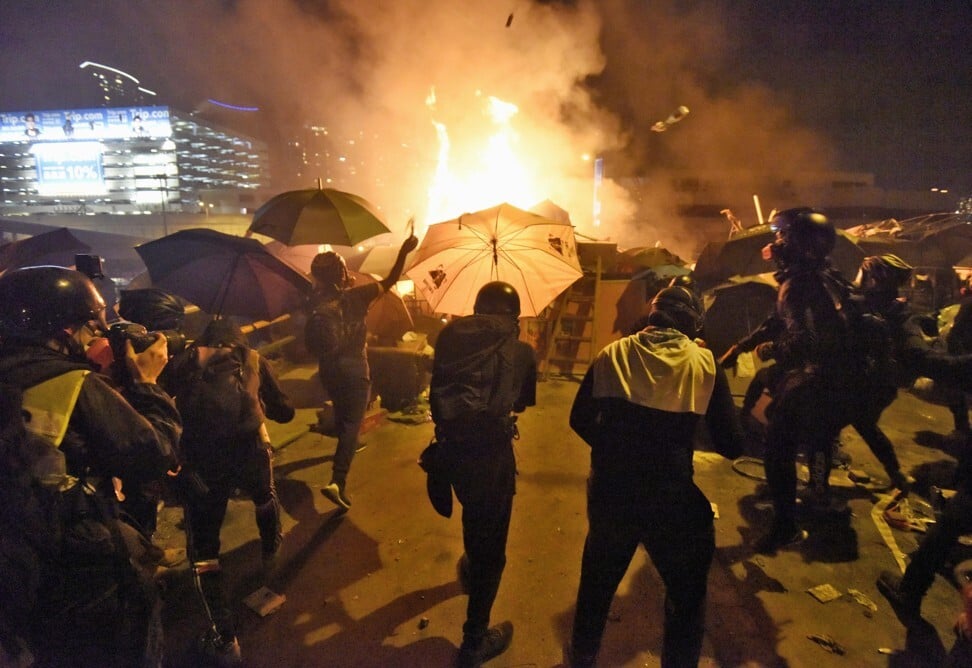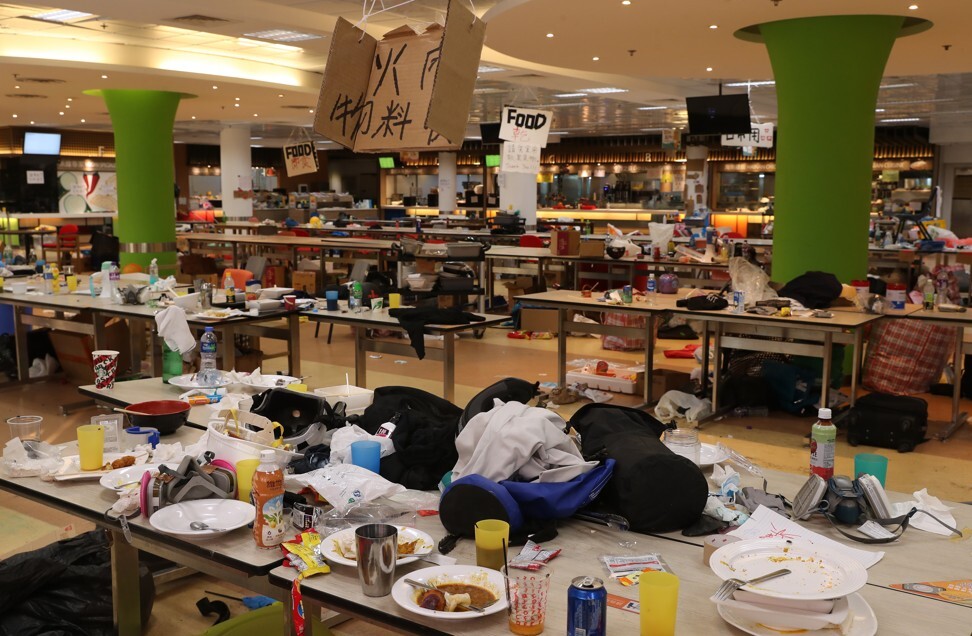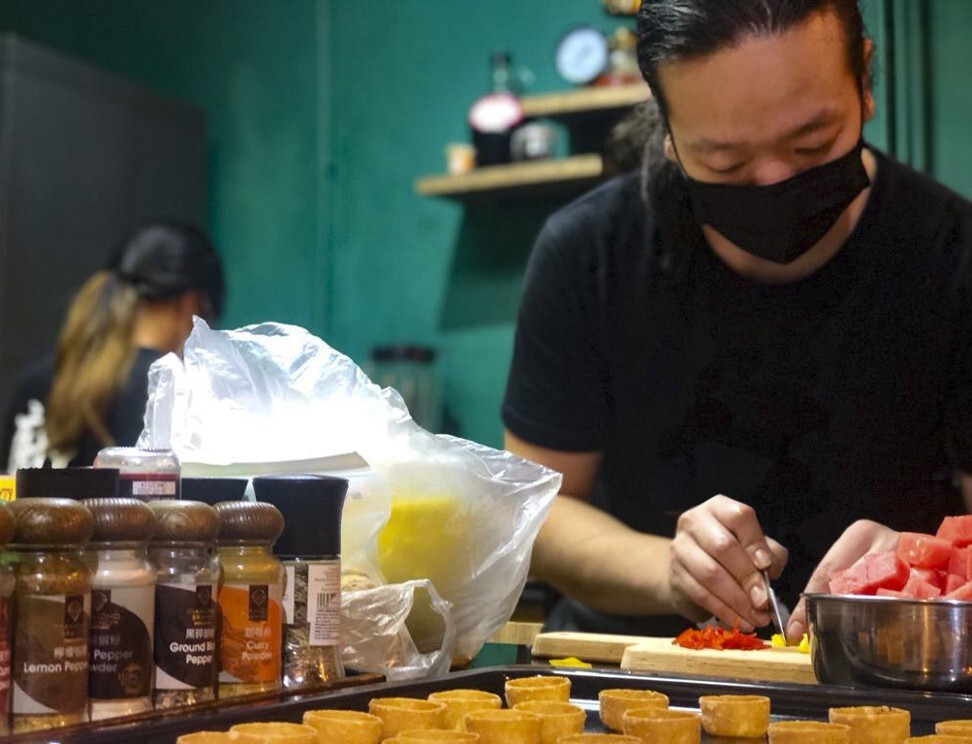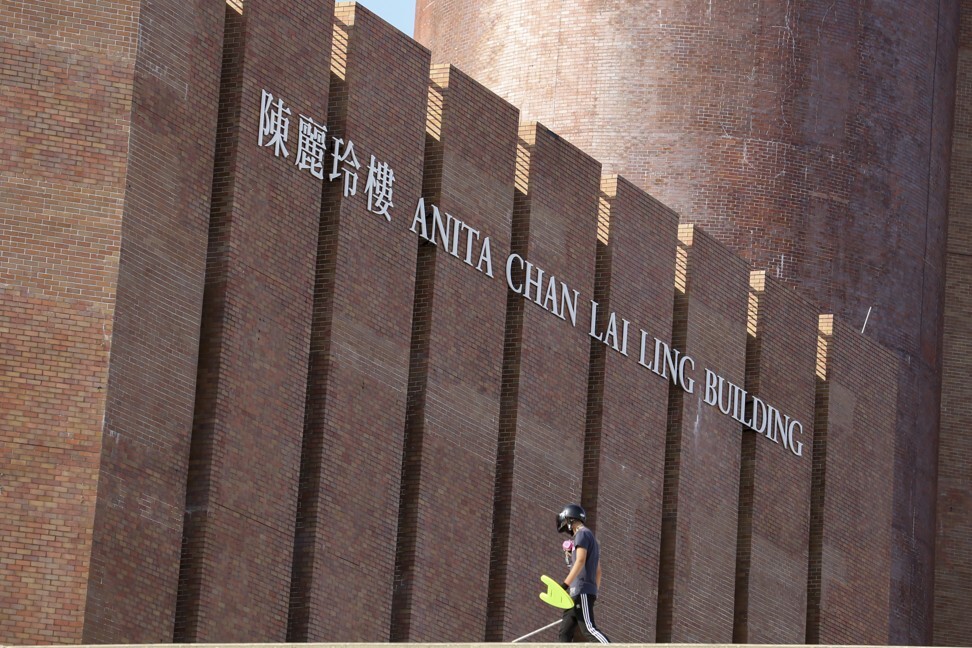
Hong Kong protests: chef at PolyU siege recalls trauma of cooking for more than 1,000 protesters before being taken to hospital
- Chef Sunny Zie had about 50 volunteers helping him at first, but numbers dwindled rapidly as the police siege of Hong Kong Polytechnic University went on
- Initially vowing to stay and cook until the last protester left, emotional problems stemming from sleep deprivation saw him eventually leave in an ambulance
Chef Sunny Zie lived a lifetime in those seven days. Cooking non-stop, he says, he survived on barely any food and no more than nine hours’ sleep in total on a cold, tiled floor, on the verge of liver failure.
“I was afraid that if I ate too much I would fall into a relaxed state and then a deep sleep. But I had to stay awake to cook for the protesters and help them recharge their batteries,” Zie says.

The PolyU stand-off also saw running battles and violent clashes involving protesters using bows and arrows, a variety of projectiles, bricks, and petrol bombs against police, who responded with tear gas.
Some protesters managed to leave the university in dramatic ways – shimmying several metres down ropes from a footbridge linking the campus to a road below, dashing away on motorbikes or leaving through an underground pipe network.
How Hong Kong taught a British-Chinese chef about Chinese food
Many protesters trying to leave who were caught by police guarding the campus perimeter were charged with rioting, left with mediators or carried out by paramedics. Meanwhile, the remaining protesters, mostly anxious and exhausted, hid in corners of the rubbish-strewn campus.
Zie says he arrived on the campus just in time. Worried the protesters would not have enough to eat as the situation escalated, he scrambled to get to the kitchen. A day after he arrived, police deployed water cannons and Unimog armoured vehicles while encircling the entire campus, blocking all exits.
Accustomed to working in restaurants, Zie says he spent days rummaging through the kitchen’s refrigerators and cupboards, putting together whatever he could find – fresh meat, vegetables, instant noodles – to feed those inside.
“Food was piling up, but 20 to 30 per cent of it was rotten because we were running out of hands to cook it,” he says.

At first, about 50 protesters, including both amateur cooks and professionals like himself, volunteered to help him in the kitchen, but the numbers dwindled rapidly, he says.
“On the second day, only half of them were left,” Zie says. “I was severely running out of helping hands in the kitchen. At one point I hadn’t slept for three days.”
He says compassion motivated him to keep going. “I wanted them to know that there was someone out there who treated them with kindness, and that they didn’t have to be afraid and hide in the darkness.”
I lost everything … including my marriage, friends and my job. But that was my choice
Preparing food was his way of taking part in the anti-government movement, Zie explains.
“I could not always join the protests because I still had a job at a Western restaurant at the time,” he says. “However, cooking for the protesters in the background was the least I could do. Before the troops [the protesters] moved, they should be fed enough first.”
Zie had initially vowed to stay and cook until the last protester left, but troubled by emotional problems stemming from prolonged sleep deprivation, he was persuaded by mediators to leave, and was eventually taken to hospital in an ambulance.
“I thought it was also a good time to leave as the ‘battlefield’ state … was already over … I prepared enough food for the protesters that stayed behind as well,” he says.

For 79 days in 2014, protesters demonstrated near government headquarters, erected barricades and pitched tents across east-west arterial routes in northern Hong Kong Island around Admiralty. Police fired tear gas and pepper spray at protesters who held up umbrellas to shield themselves – hence the name.
For two months, Zie joined the umbrella movement sit-ins for eight hours each day after quitting his full-time job at a restaurant. He says the restaurant he had worked at provided thousands of lunchboxes for police officers daily, even though they had been accused of treating protesters brutally.
“I couldn’t stand the idea of cooking for the police at the time … I got into a fight with my pro-police boss. Later, I quit my job,” he says.

After the umbrella protests ended, Zie hoped to raise funds for political movements by starting a restaurant, which he refers to as the start of his “cooking battle”. But his wife of 10 years, some relatives and all his friends, who were either pro-Beijing or politically apathetic, could not agree with his stance and severed ties with him.
“I lost everything … including my marriage, friends and my job,” he says. “But that was my choice.”
As the umbrella movement fizzled out, the chef’s pro-democracy dreams and support system crumbled. He was left alone, without a job or financial stability.
Zie says he fell into a deep depression, and even tried to kill himself. Relatives sent him to a hospital psychiatric ward, where he was diagnosed with bipolar disorder. He spent a month in the ward before leaving and trying to find a new job.
A cook for 11 years, Zie didn’t want to give up on his career. He found a new job at a bakery, while pondering future plans.

He fell in love with cooking when he was young after being taught by his parents, who ran a fruit stall. “I enjoy cooking so much because it can utilise all five senses: sight, smell, taste, hearing and touch. And [it can also do] simple things such as bringing joy to people.”
Zie still has mental health problems, but he is now planning to start his own business and hire anti-government protesters who have lost their jobs.
“I want to open a Western-style food chain that prepares party food, [providing it to places] ranging from restaurants to factories,” he says. “Creating an economic system is a way to battle against the unfair political system. My dream is that … finally, the city can become truly democratic.”


